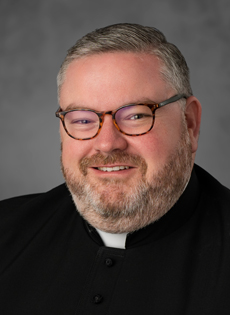
Message from Fr. D. Ryan Saunders
St. David Catholic Parish
Dear Saint David Family,
In today’s Gospel from Matthew (4:12–23), we hear Jesus proclaim words that are both simple and profound: “Repent, for the kingdom of heaven is at hand.”
With these words, Jesus begins His public ministry, calling ordinary men fishermen along the Sea of Galilee to leave what they know and follow Him. Their response is immediate and wholehearted. They recognize that something new is happening, something worth giving their lives to.
This call of Christ continues to echo in our own lives today. Repentance is not merely about turning away from sin; it is about turning toward something greater toward Christ, toward mission, toward the work of building God’s kingdom here and now. As we draw closer to Lent in just a few short weeks, this familiar phrase invites us to prepare our hearts, to examine where God may be calling us to deeper faith, generosity, and trust.
One way we live out this call is through our participation in the Archbishop’s Charities and Development Drive (ABCD). ABCD is more than a collection it is a concrete expression of discipleship. Through our shared generosity, we support the formation of future priests, care for those in need, and strengthen ministries that bring Christ’s love to countless lives throughout our Archdiocese.
This weekend, we were especially blessed to hear Deacon Carlos share his vocation story. His journey is a powerful witness to how God continues to call men and women to serve His Church. We are deeply grateful to Deacon Carlos for his openness and faith, and we thank all of you whose generosity through ABCD has helped support his formation as he prepares, God willing, for priestly ordination this coming May. Your gifts truly make a difference not only in his life, but in the future life of the Church.
Like the fishermen in today’s Gospel, we too are invited to respond to leave behind comfort, hesitation, or indifference, and to follow Christ with renewed commitment. May we recognize that the kingdom of heaven is indeed at hand, present whenever we answer Christ’s call with faith and generosity.
Thank you for your continued support of ABCD, for your prayers for Deacon Carlos, and for the many ways you live out the Gospel each day.
May the Lord bless you and your families abundantly.
Fr. D. Ryan Saunders